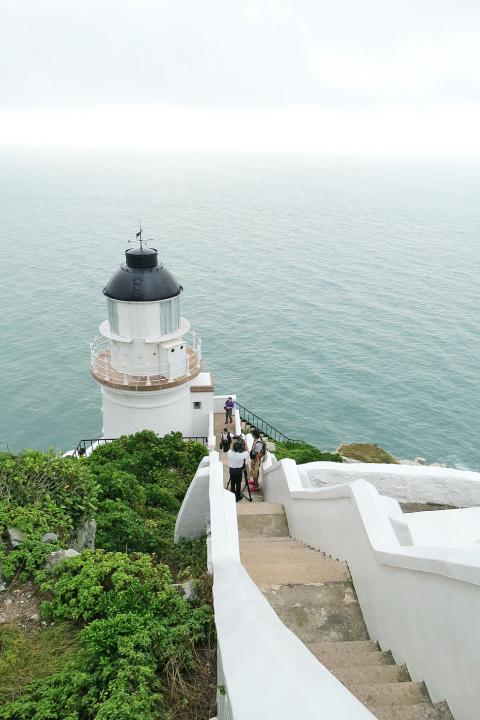A 112-year-old lighthouse on one of the outlying islands of Matsu has been upgraded to a national historical monument, with a ceremony marking the event to be held on July 1, Lienchiang County Cultural Affairs Department Director-General Wu Hsiao-yun (吳曉雲) said.
Dongyong Lighthouse in Lienchiang County’s Dongyin Township (東引) was first designated a national historical landmark by the Council of Cultural Affairs in 1988, but it was later downgraded to a county heritage site following changes to the Cultural Heritage Preservation Act (文化資產保存法).
Lienchiang County had been fighting for the lighthouse to reattain its status as a national landmark since 2008, Wu said.

Photo: Yu Chao-fu, Taipei Times
The county’s appeal gained ground after a restructuring of the Executive Yuan, which transferred management of the lighthouse from the Ministry of Finance’s Customs Administration to the Ministry of Transportation and Communication’s Maritime and Port Bureau, whose director-general, Chi Wen-jong (祁文中), supported the application, Wu said.
The European-style lighthouse situated on the slope of Shih Wei Mountain (世尾山) was built with financing from the British government a year after the British steamer SS Sobraon ran aground and sank near Dongyin Island in 1901, the Matsu National Scenic Area office said.
Although all passengers and crew survived the shipwreck, the shipping firm suffered heavy losses, and with the opening of maritime traffic to the Port of Sandu, it was decided that a lighthouse was necessary to mitigate navigational risks.
The lighthouse used to be a strictly restricted facility and lighthouse workers lived with their families in an adjacent dormitory, and raised their own chicken and pigs for meat.
The materiel and comforts provided by the lighthouse was said to be the envy of local residents, who nicknamed the facility “the Dongying Mansion,” which has stuck to this day.
The elegant structure has become a major attraction for tourists — including South Korean, Chinese and Western visitors.
Lienchiang County Commissioner Liu Tseng-ying (劉增應) said he was glad to see the lighthouse’s designation as a national historic monument, adding that he hoped the Maritime and Port Bureau and the Department of Cultural Affairs would invest resources in the lighthouse to promote tourism on Matsu.
The lighthouse could become a third attraction in addition to Matsu’s famed rare Chinese crested tern and bioluminescent blue tide, Liu said.

The Ministry of Economic Affairs has fined Taobao NT$1.2 million (US$36,912) for advertisements that exceed its approved business scope, requiring the Chinese e-commerce platform to make corrections in the first half of this year or its license may be revoked. Lawmakers have called for stricter enforcement of Chinese e-commerce platforms and measures to prevent China from laundering its goods through Taiwan in response to US President Donald Trump’s heavy tariffs on China. The Legislative Yuan’s Finance Committee met today to discuss policies to prevent China from dumping goods in Taiwan, inviting government agencies to report. Democratic Progressive Party Legislator Kuo Kuo-wen (郭國文) said

The Ministry of Economic Affairs has fined Taobao NT$1.2 million (US$36,900) for advertisements that exceeded its approved business scope and ordered the Chinese e-commerce platform to make corrections in the first half of this year or its license would be revoked. Lawmakers have called for stricter supervision of Chinese e-commerce platforms and more stringent measures to prevent China from laundering its goods through Taiwan as US President Donald Trump’s administration cracks down on origin laundering. The legislature’s Finance Committee yesterday met to discuss policies to prevent China from dumping goods in Taiwan, inviting government agencies to report on the matter. Democratic Progressive Party

Taiwan and its Pacific ally Tuvalu on Tuesday signed two accords aimed at facilitating bilateral cooperation on labor affairs, according to Taiwan’s Ministry of Foreign Affairs (MOFA). The governments inked two agreements in Taipei, witnessed by Foreign Minister Lin Chia-lung (林佳龍) and visiting Deputy Tuvaluan Prime Minister Panapasi Nelesone, MOFA said in a news release. According to MOFA, the agreements will facilitate cooperation on labor issues and allow the two sides to mutually recognize seafarers’ certificates and related training. Taiwan would also continue to collaborate with Tuvalu across various fields to promote economic prosperity as well as the well-being of their

Sung Chien-liang (宋建樑), who led efforts to recall Democratic Progressive Party (DPP) Legislator Lee Kun-cheng (李坤城), was released on bail of NT$80,000 today amid outcry over his decision to wear a Nazi armband to questioning the night before. Sung arrived at the New Taipei District Prosecutors’ Office for questioning in a recall petition forgery case last night wearing a red armband bearing a swastika, carrying a copy of Adolf Hitler’s Mein Kampf and giving a Nazi salute. Sung left the building at 1:15am without the armband and covering the book with his coat. Lee said today that this is a serious